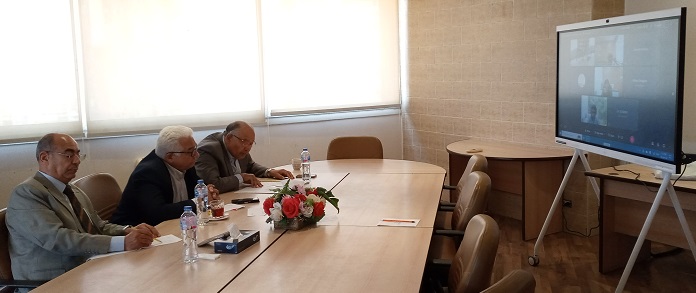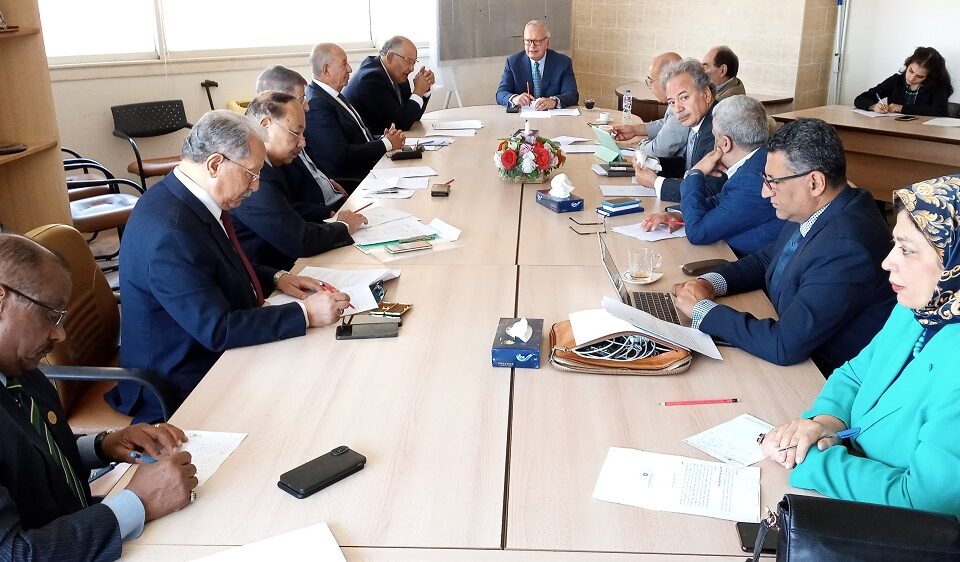Symposium by former Foreign Minister Nabil Fahmy about his book “At the Heart of Events… Egyptian Diplomacy in War, Peace and Years of Change”
May 25, 2022Visit by the delegation of the Group of Eight Developing Countries (D-8) Headed by Ambassador/ Isiaka Imam
May 30, 2022
On May 30, 2022, ECFA hosted Ambassador Ragui El Etreby, Alternate Executive Director and host for Egypt and the Arab Countries at the World Bank Group and a member of the Board of Directors, to talk about “The partnership between Egypt and the World Bank Group and its impact on economic reform and development.” The meeting was opened by Ambassador Dr. Mounir Zahran, ECFA Chairman, and attended by the two ambassadors, Dr. Ezzat Saad, ECFA Director, and Dr. Hisham Al-Zimaity, and Dr. Sadeq Abdel-Aal, and Dr. Mohamed Hassouna, as well as a number of researchers. Ambassador El Etreby mentioned that the current international scene is very complex and volatile, and that the world has not witnessed, since World War II, three consecutive major crises, as it witnessed during the past few years; as the climate crisis, the Covid-19 pandemic, and the war in Ukraine, pointing out that the simultaneity of such crises makes their repercussions the norm on the international stage, rather than the exception, for at least 5 to 10 years, which requires the need to think about opportunities to adapt to them pending finding radical solutions to them.
He added that China’s ability to bridge the global economic vacuum resulting from all of these crises, given its enormous economic power, has become highly questionable, given its internal problems related to inflation in the prices of raw materials, real estate, health, technology and demography, in addition to the conflicts that still exist between China and the United States, and therefore it is not possible to rely on China alone to advance the global economy.
As for the World Bank, Ambassador El-Etreby stated that it is no secret that it is one of the models of multilateral banks, the most widespread, and the largest in terms of annual financing with an annual budget of $1.1 trillion, and its membership now includes 190 countries, compared to 45 countries at the time of its establishment, in addition to the ability of its agenda to adapt with and cover new issues. With regard to the Egyptian side, the guest indicated that the strategic partnership agreement between Egypt and the World Bank 2015/2016 is an important tool for enhancing communication between the two sides. He added that the bank did not cut off its funding to Egypt for one day, despite the crises and events that the Egyptian state went through. It is noteworthy in his regard that the aforementioned state of strategic partnership has made Egypt expand in the development projects that the country has recently witnessed. In this regard, the two parties succeeded in setting a new five-year period for that partnership, starting this year, replacing the period between 2015 and 2019. In a related context, the guest stressed that it is necessary for the Egyptian economy to have the features of diversity, the ability to modernize, flexibility, resilience, and further integration in the global economy, all in conjunction with strengthening institutional structures to be more resilient, more efficient, and effective, including resource and debt management, while enhancing export policies and encouraging demand.






